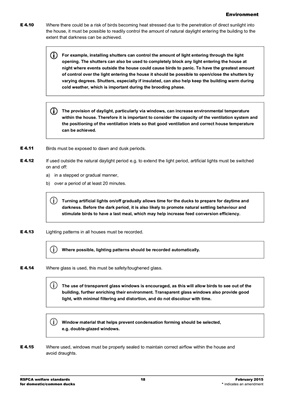
Environment
RSPCA welfare standards
for domestic/common ducks
18 February 2015
* indicates an amendment
E 4.10 Where there could be a risk of birds becoming heat stressed due to the penetration of direct sunlight into
the house, it must be possible to readily control the amount of natural daylight entering the building to the
extent that darkness can be achieved.
For example, installing shutters can control the amount of light entering through the light
opening. The shutters can also be used to completely block any light entering the house at
night where events outside the house could cause birds to panic. To have the greatest amount
of control over the light entering the house it should be possible to open/close the shutters by
varying degrees. Shutters, especially if insulated, can also help keep the building warm during
cold weather, which is important during the brooding phase.
The provision of daylight, particularly via windows, can increase environmental temperature
within the house. Therefore it is important to consider the capacity of the ventilation system and
the positioning of the ventilation inlets so that good ventilation and correct house temperature
can be achieved.
E 4.11 Birds must be exposed to dawn and dusk periods.
E 4.12 If used outside the natural daylight period e.g. to extend the light period, artificial lights must be switched
on and off:
a) in a stepped or gradual manner,
b) over a period of at least 20 minutes.
Turning artificial lights on/off gradually allows time for the ducks to prepare for daytime and
darkness. Before the dark period, it is also likely to promote natural settling behaviour and
stimulate birds to have a last meal, which may help increase feed conversion efficiency.
E 4.13 Lighting patterns in all houses must be recorded.
Where possible, lighting patterns should be recorded automatically.
E 4.14 Where glass is used, this must be safety/toughened glass.
The use of transparent glass windows is encouraged, as this will allow birds to see out of the
building, further enriching their environment. Transparent glass windows also provide good
light, with minimal filtering and distortion, and do not discolour with time.
Window material that helps prevent condensation forming should be selected,
e.g. double-glazed windows.
E 4.15 Where used, windows must be properly sealed to maintain correct airflow within the house and
avoid draughts.